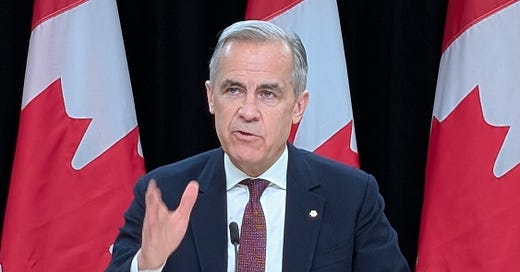Carney's clarity act
If the government's going to change how it spends, it should change how it talks about spending
These budget cuts are a thing. At coffee the other day, somebody who depends on government funding got the email outlining the spending review — a three-year process leading to 15% cuts in spending in most federal government programs — and suddenly this friend had a harder time concentrating on coffee. A lunch companion said she was heading back to the office to continue work on her shop’s spending-reduction plan. “It’s the big job this summer.”
I could contrast this with the horrible debacle of the Trudeau government’s 2022-2024 spending review, which came in like a lamb and went out like a smaller, sickly lamb, but I guess we don’t yet know how much contrast there’ll be yet. I think there’ll be considerable contrast. Justin Trudeau seemed honestly to believe that spending less on anything at all this year than last was a sign of wickedness. In the end, the 2024 budget did not even contain a unified list of cuts or “re-allocations” under a review process the Trudeau crew had run on and announced twice. “Results of this first phase are outlined in the Main Estimates, 2024-25 and the 2024-25 Departmental Plans,” the budget said. The estimates, in turn, referred readers (all six of us) to this annex, which was only a list of numbers with no indication of what the government would stop spending money on. This was pathetic. I still get moody when I think about it.
Mark Carney, on the other hand, seems to regard spending as something that can reasonably go up or down. Since he wants it to go up in a lot of places, especially military procurement, it will theoretically need to come down elsewhere.
There is already a voluminous speculative literature about this process. Pieces I’ve enjoyed reading come from the mighty Kathryn May at the Institute for Research on Public Policy; the prolific David McLaughlin; the skeptical Ian Brodie; Kathryn May again; former Chrétien-era Clerk of the Privy Council Jocelyne Bourgon, usefully parsed here by McLaughlin; Carleton prof Jennifer Robson; and former Trudeau-era Clerk Michael Wernick, who’s been popping up all over but who emphasizes here that serious public-service reform will be imposed by events even if the Carney government doesn’t plan for it in advance.
One theme running through the commentary is that everyone is guessing what the Carney spending review process will be, based on spotty and sometimes contradictory reporting from journalists who’ve felt parts of the elephant but not all of it. So let’s start there. I’m not sure it’s a good idea to make this process secret or leave it to guesswork.
Keep reading with a 7-day free trial
Subscribe to Paul Wells to keep reading this post and get 7 days of free access to the full post archives.




